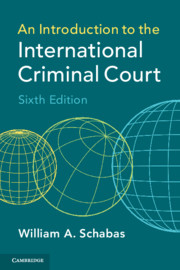Book contents
- An Introduction to the International Criminal Court
- An Introduction to the International Criminal Court
- Copyright page
- Contents
- Preface
- Abbreviations
- 1 Creation of the Court
- 2 The Court Becomes Operational
- 3 Jurisdiction
- 4 Triggering the Jurisdiction
- 5 Admissibility
- 6 General Principles of Criminal Law
- 7 Investigation and Pre-Trial Procedure
- 8 Trial and Appeal
- 9 Punishment
- 10 Victims of Crimes and Their Concerns
- 11 Structure and Administration of the Court
- Appendices
- Bibliography
- Index
1 - Creation of the Court
Published online by Cambridge University Press: 09 June 2020
- An Introduction to the International Criminal Court
- An Introduction to the International Criminal Court
- Copyright page
- Contents
- Preface
- Abbreviations
- 1 Creation of the Court
- 2 The Court Becomes Operational
- 3 Jurisdiction
- 4 Triggering the Jurisdiction
- 5 Admissibility
- 6 General Principles of Criminal Law
- 7 Investigation and Pre-Trial Procedure
- 8 Trial and Appeal
- 9 Punishment
- 10 Victims of Crimes and Their Concerns
- 11 Structure and Administration of the Court
- Appendices
- Bibliography
- Index
Summary
International criminal justice began with efforts to prosecute Germans, including the former Emperor Wilhelm II, following the First World War. The first international trials took place at Nuremberg and Tokyo in the aftermath of the Second World War. In the early 1990s, the United Nations International law Commission submitted a draft statute for an international criminal court to the General Assembly. Subsequent work under the aegis of the Assembly culminated in the 1998 Rome Conference and adoption of the Rome Statute of the International Criminal Court. It entered into force in 2002. Meanwhile, several temporary international criminal tribunals were set up for situations in the former Yugoslavia, Rwanda, and Sierra Leone.
Keywords
- Type
- Chapter
- Information
- An Introduction to the International Criminal Court , pp. 1 - 22Publisher: Cambridge University PressPrint publication year: 2020

